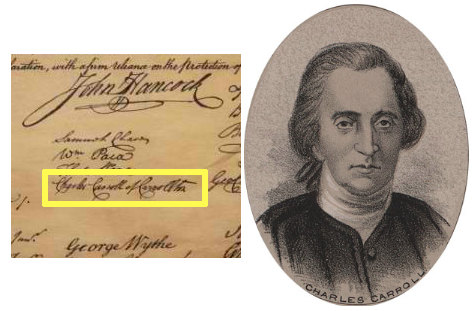
Posted on 07/04/2017 8:07:38 PM PDT by Coleus
Every July 4th, citizens of the United States of America everywhere celebrate Independence Day, commemorating the adoption of the Declaration of Independence and separation from British rule. The Continental Congress had actually voted to approve a resolution of independence on July 2nd and declare the Thirteen Colonies a new nation, the United States of America.
However, it would not actually come until two days later that the Declaration of Independence was drawn up, revised by the Continental Congress, and officially signed. Were any signers of the Declaration of Independence Catholic?
Of the 56 total signatories of the Declaration of Independence, only one was Catholic: Charles Carroll. Carroll was born September 1737 to a wealthy Annapolis, Maryland family. He was raised Catholic and educated in Jesuit colleges in Maryland and France before finally studying law in Paris and London.
In 1765, he returned to Maryland as an educated man to take over the family estate. He began adding “of Carrollton” to his signature as a way to distinguish him from his father and cousin with similar names.
In 1774, Carroll was approached by Benjamin Franklin who asked for his help in gaining the assistance of the Canadian government for the impending Revolutionary War.
While not successful, his work gained him an appointment to the Continental Congress where he advocated early and often for an armed resistance against the British on the Board of War.
Although Carroll was not present for the independence vote on July 2nd, he was present for the signing of the Declaration of Independence, making him the only Catholic signatory of the historical document.
When it came time for Charles Carroll to write his signature, he went to the document on a desk near John Hancock and simply wrote “Charles Carroll,” before returning to his seat. One of the 56 signatories, who was prejudiced against his Catholic Faith, jested that Carroll risked nothing by signing because there must be many men who share his name in the Thirteen Colonies, and if caught the King of England would not execute him without proof he was the same that signed the Declaration. Charles Carroll simply rose once again, took the pen from John Hancock, and added “of Carrollton” to his signature.
His cousin, John Carroll, was also the first Bishop and Archbishop in the United States in Baltimore. Not only was Charles Carroll the only Catholic signer of the declaration, he was also the last living surviving signer, dying in Baltimore at the age of 95 in 1832. Today he is remembered for his influential role in moving the Thirteen Colonies and Continental Congress towards independence from British rule.
Charles Carroll was one of the people who tried to help George Washington when he was at Valley Forge. When the Continental Congress was slow to act, Carroll stepped up and helped out as much as he was able. They remained good friends and Washington frequently sought out his legal advice.
and how many signers were Muslim?
57 of the 56.
None.
All of the Founders, regardless of religious affiliation, shared the same moral philosophy based on virtue and belief in the providence of God. That is the biggest reason why the Constitution was written so quickly. They all agreed on the first principles. They did have political differences, as in the Federalists and the Anti-federalists, but they did agree on all of the most fundamental ideals.
Muslims at that time were pirates.
Muslims?? None...they boycotted it, since it was contrary to the Queeron...:-)
So nothing's changed?


That is true. One of the Founders, I think it was Jefferson, wrote about the Barbary “muslim” pirates. I read it a while back and I got the impression that they devoid of conscience.
The same number that were Jewish.
Very few Jews were Loyalists. In some colonies, they were prevented from holding office since they were not Christian, but that is not to say that they were not treated fairly during colonial times.
Aside from their service in the army, Haym Solomon played a role in raising money to pay the troops, government functionaries as well as congressmen (and even loaned money to James Madison).
As you likely know, Maryland was a Catholic colony and if it were not for that and the wealthy and well respected Carrolls, there would have been no Catholic Signers.
Charles Carroll of Carrollton was by all accounts an honorable man. He took no small amount of risk in being signatory to a document guaranteeing religious freedom as his church hierarchy opposed it, and it was indeed opposed officially up to Vatican II in 1965.
The Declaration guaranteed religious freedom? I don't think so. Even the Constitution made no such guarantee.
Mentions Bishop John Carroll but not John’s brother Daniel Carroll, who signed the US Constitution; one of five men to sign both the Articles of Confederation and the Constitution.
Some did, some didn't. Some had a State Church and essentially ignored it, like NC. All eventually abolished them as well they should have long before. There were several less than desirable survivals of British rule from which it took some time to disentangle ourselves, this is but one example. A clean, quick separation while ideal was not the actual reality of the matter.
Does that somehow negate the Constitution in your eyes?
HOORAY Charles Carroll of Carrollton
ping
Disclaimer: Opinions posted on Free Republic are those of the individual posters and do not necessarily represent the opinion of Free Republic or its management. All materials posted herein are protected by copyright law and the exemption for fair use of copyrighted works.